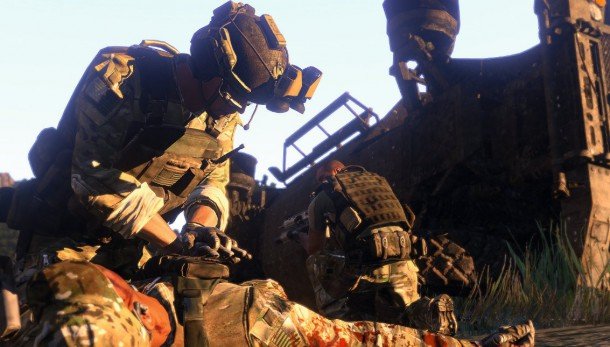
Welcome to the PC Gamer Game of the Year Awards 2013. For an explanation of how the awards were decided, a round-up of all the awards and the list of judges, check here .
A good sim pursues the lofty, unreachable goal of total realism. They shun accessibility in favour of complexity, but in doing so allow devoted and patient players to access marvellously detailed facsimiles of reality, which can inspire great gaming stories and player-driven drama. In the case of our simulation of 2013, it's a beautiful, sprawling and customisable depiction of modern military conflict, Arma 3.
EVAN It isn't any one piece of Arma's fidelity – the ballistics modelling, the variegated island, the intricate military gear – that wows us. It's how the sum of those replicates the experience of being a soldier – something very distinct from being an avatar who happens to fire guns. You've got to know how to read a topographical map. You've got to know how to communicate with brevity and clarity while being shot at.
You have to think critically about stuff like encumbrance. When I'm gearing up for a mission, throwing a satchel charge in my backpack may help me knock out a hard target, but the extra weight will tire me out more quickly when I sprint. So maybe I'll have a teammate taxi me across the map on an ATV. But wait – the sun is setting, so we'll probably have to drive with the headlights on and risk detection, since we don't have nightvision goggles. Unless we find and kill an enemy who does. Again: it's not the individual realisms but how they knit into each other and prompt thoughtful decisions.
CORY I scoffed when Evan offered to teach me the ropes in Arma 3. Nothing sounds more boring to me than yelling out bearings and scrambling to find 7mm ammo instead of 6mm ammo. The UI is intimidating and the level of detail is daunting. I play games to escape from realism, not embrace it.
Evan's enthusiasm won me over, however, and he finally convinced me to join him on a mission. With a little bit of guidance, I was leaning around cover and marking coordinates on the map like – well, not a pro, but like someone who might actually survive a mission. I marvelled at how seriously Arma takes its systems. Evan showed me how to move through all nine of Arma's infantry stances, when I was perfectly comfortable with crouching the entire game. And after he showed me how to use Alt to move just my soldier's head while moving forward, it became a feature I want in every FPS.
Eventually, we had to defend a compound from nondescript soldiers driving camouflaged, armoured jeeps with heavy machineguns (or so Evan tells me). Evan was pinned down in a far-off area (or maybe he just wanted me to feel useful), so he had me take over a downed jeep and use its HMG to hold off troops and vehicles at a distance. A quick keypress activated thermal vision, and I spent 15 minutes picking off enemies at range. It was glorious.
Keep up to date with the most important stories and the best deals, as picked by the PC Gamer team.
I was sceptical, but now I'm a believer. Arma 3 is not only an impressive simulation of battle, but it's an incredibly compelling co-op sandbox. I've played some janky Steam Workshop content that was still fun because of the group I played it with. I'll probably never play Arma alone, but I'll always jump in with some friends.
EVAN Even if you don't set out to roleplay, you inevitably end up doing something military like reciting compass directions as individual numbers (like “bearing one-eight-zero” to indicate south), or acronyming everything, or freely yelling phrases like “suppressive fire!” Because it feels like the appropriate thing to do. It's wonderful that something centred on realism can stimulate such playfulness.
Beyond all that, Arma 3's Altis map was the most detailed world in a videogame this year – a slab of Mediterrania jigsawed with salt flats, jungle shrubs, solar power plants and postcard-worthy beach resorts.
PC Gamer is the global authority on PC games—starting in 1993 with the magazine, and then in 2010 with this website you're currently reading. We have writers across the US, Canada, UK and Australia, who you can read about here.


